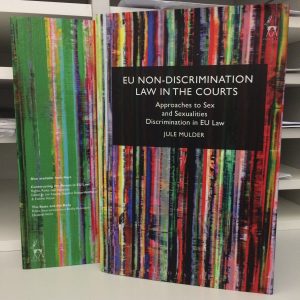By Dr Jule Mulder, Lecturer in Law (University of Bristol Law School).
 In January 2017, my first monograph entitled EU Non-Discrimination Law in the Courts will be published with Hart Publishing/Bloomsbury. The monograph compares the Dutch and German application of EU non-discrimination law focusing on discrimination on grounds of sex and sexual orientation. It includes an analysis of the case law on direct as well as indirect discrimination and covers the cases which are linked to Article 157 TFEU, the Framework and Recast Directives (excluding equal pay for equal value and social security law).
In January 2017, my first monograph entitled EU Non-Discrimination Law in the Courts will be published with Hart Publishing/Bloomsbury. The monograph compares the Dutch and German application of EU non-discrimination law focusing on discrimination on grounds of sex and sexual orientation. It includes an analysis of the case law on direct as well as indirect discrimination and covers the cases which are linked to Article 157 TFEU, the Framework and Recast Directives (excluding equal pay for equal value and social security law).
Since the year 2000, the material and personal scope of EU non-discrimination law has been significantly broadened and has challenged national courts to introduce a comprehensive equality framework into their national law to correspond with the European standard.
The book provides a multi-layered culturally informed comparison of juridical approaches to EU (in)direct sex and sexualities discrimination and its implementation and application in Germany and the Netherlands. It examines how and why national courts apply national non-discrimination law with a European origin differently, although the legislation derives from the same set of EU law and the national courts have to respect the interpretive competence of the Court of Justice of the European Union. As such, it provides an in-depth analysis of the national legal and non-legal context which influences and shapes the implementation and application of non-discrimination law and reveals how some of these factors affect the interpretation and application of national non-discrimination law with a European origin. (more…)

